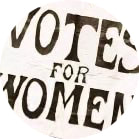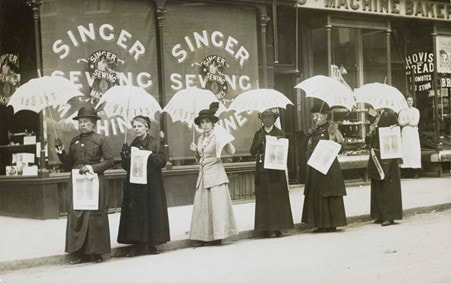|
Emily Brandon was arrested in November 1911. She was charged with obstructing Parliament Square, on 21 November, by trying to force her way through the police cordon. The police stated they had repeatedly requested her to move, when she refused, they arrested her. In court, Emily stated, “the Manhood Suffrage Bill is an insult to the women of England, and I did it as a protest.” She was fined five shillings or five days in prison. She elected imprisonment. Emily was born Emily Charlotte Mcmahon Foyle, in London, in 1878. The family lived in Aldgate, London where her father was a warehouseman. When Emily left school, she worked in a hotel in Hanover Square in the West End of London as a clerk. On 16 June 1901, Emily married Albert Brandon, an upholsterer, from Tring, Buckinghamshire. The couple settled in Chesham, Buckinghamshire where Emily founded the Chesham branch of the Women’s Social and Political Union. She died in 1968 in North London. The Amnesty Records next entry is Mary Grace Branson. Her correct name is, as recorded on the Suffragette Roll of Honour, Grace Mary Branson. Grace was born, in 1870 in Middlesbrough, Yorkshire, to John, an ironmaster and Margaret Jones. John and his brothers founded Jones Bros & Co, a company which built the Ayrton Rolling Mills comprised of furnaces and mills erected to manufacture sheets for shipbuilding. By the time of the 1891 census, John had moved into the manufacture of concrete and Grace had left home to attend the University of London. In 1898, Grace married Frederick George Reddy Branson, an attorney in the Judicial Department of the East India Company, based in Madras. The couple had one daughter, Edith Rosa Grace, born on 26 May 1899 in Madras. Frederick died in 1903. Mother and daughter returned to England. Edith attended the private school, Rodean in Brighton. Like many suffragettes, Grace seized the opportunity to officially record her opinions on the 1911 census return: “Until I am acknowledged to be a citizen of Great Britain I refuse to carry out the duties of citizens.” In residence with Grace on the night of the census were Edith, Mrs Harvey, a visitor, and her three children: a daughter and two sons. Edith went onto to marry one of the anonymous sons of Mrs Harvey, Charles Donald Warren Harvey. Grace was arrested twice, March 1912 and February 1913. The first time was for breaking windows in the Haymarket, belonging to John Dewar & Sons Ltd, valued at £40 and H E Randall Ltd, worth £30. She was sentenced to four months in Holloway Prison. However, she was one of the women transferred to Aylesbury Gaol. Rule 243a stated that for any prisoner, whose character was previously good and who was not either awaiting trial or been sentenced for a crime involving dishonesty, cruelty, indecency or serious violence, the prison authorities could ameliorate the rules in respect of wearing prison clothes; bathing; exercise; visitors or books. However, such relaxing of the rules was only allowed at the direction of the Home Secretary. On 9 April, a report noted that it had just come to the attention of the prison staff that the women had been starving themselves, for three or four days, in protest at the lack of response to their petition requesting privileges within Rule 243A. Initially, the suffragettes believed that the necessity for hunger-striking, to highlight their lack of recognition as political prisoners, was over, even if the relaxation of the prison rules was not as extensive as that accorded to male political prisoners. However, those imprisoned, along with Grace, were only allowed to wear their own clothes and to converse when exercising, which fell far short of a relaxation of the rules in recognition of their status as political prisoners. When no further concessions were forthcoming, the women, including Grace, went on hunger strike. The food, though, disappeared as if eaten. The prison wardresses presumed it had been eaten, but it soon became clear it was being hidden by the prisoners and disposed of down the toilet. The decision was taken to commence force-feeding. Nine were fed using a feeding cup, two by stomach tube and twelve by nasal tube. The process, for all nine, took three hours and forty-five minutes to complete. The second day, it was decided to discontinue force feeding four of the women, one of which was Grace, as the medical officer felt it was inadvisable to continue and recommended immediate release. The Prison Commission dispatched Dr Smalley to Aylesbury and proposed that the two women considered to be the ringleaders should be moved to Manchester Prison. Smalley reported back that the four, including Grace who, in his view, was suffering from aortic disease, should be released. A recommendation which was followed; Grace was released having served twenty-four days of her sentence. Her condition on release was described as ‘very fair.’ A heated debate followed in the House of Commons. McKenna, the Home Secretary, argued that the crimes were sufficiently serious to deny the privileges accorded by Rule 243a, and if the women would eat, forcibly feeding them would not have been necessary. Those opposed to their treatment pointed out that it was the lack of recognition as political prisoners that led to the hunger strike. The following year, Grace was charged with breaking three windows at the Junior Carlton Club, valued at £4 10 shillings. Three other clubs were stated to have also been targeted together with the home of Prince Christian, Schomberg House which stood adjacent to the Oxford and Cambridge Club. The women used clay balls, iron nuts and stones. Only three women were arrested. At her trial, Grace said ‘I did it as a suffragette and as one who protests against the government of the country by men alone. Also the fact of prostitution existing is enough to justify any of these acts on our part. This standard of morality makes us women sick to death, and we are going to cleanse and abolish it. You men ought to be ashamed of letting women come here on charges of soliciting.’ Grace’s drawing attention to women being brought before the courts for prostitution highlighted the inequity that suffragettes and suffragists felt at the women facing charges. While the men, who sought out prostitutes, were not detained. Found guilty, she was sentenced to two months in prison. This time she was sent to Holloway. Alongside Sylvia Pankhurst and Edith Ball, she was force-fed. Grace is mentioned in a letter that Sylvia wrote to her mother, Emmeline. She describes in graphic detail the process of being force-fed “They prise open my mouth with a steel gag…My gums are always bleeding.” She wrote that the authorities claimed they did not resist “Yet my shoulders are bruised with struggling...”. She mentions that Mrs Branson, Grace, has a heart defect and wonders whether anything can be done. Sylvia’s experiences were published in the press, which caused a furore. A meeting was held at which the Bishop of London protested at the barbarity of force-feeding. In response, a debate took place in the House of Commons. Mackenna, the Home Secretary, stated that the women were prepared to die, which he did not intend to let them do, thus force-feeding was a necessity. The movement needed to be broken down using “patience, forbearance and humanity.” It is a shocking stretch to imply that keeping the women from starving themselves to death by force-feeding is a sign of humanity. He proposed, in response to the growing public disgust at the practice, that the women could be freed on licence if their health was in danger. This proposal would become the Cat and Mouse Act where women were released on licence and when they had physically recovered were taken back inside to serve the rest of their sentence.
Early in April 1913, Grace was released. She spoke to the press describing how one suffragette had learnt how to contract her throat so that a finner tube had to be used, but this was not before she had had two teeth smashed. The treatment of Grace, and many others, forced the government into the release on licence of women whom it was felt could not endure the practice of force-feeding, but it did not alter their stance on the vote or the practice of force-feeding until it could be endured no longer. Following a raid of the WSPU offices in 1913, Grace wrote to the authorities demanding the return of a medal belonging to her, which had been removed from the premises. The response was a curt one-sentence letter from the Chief Inspector of Police, denying that they had taken the medal. In the Autumn of 1917, Edith applied to study at Bedford College, part of the University of London. Grace’s occupation was noted as an oxy-acetylene welder, presumably as part of the war effort. Grace and her daughter and son in law settled in Devon. Grace died in 1961.
0 Comments
Leave a Reply. |
Categories
All
|
Proudly powered by Weebly


 RSS Feed
RSS Feed
